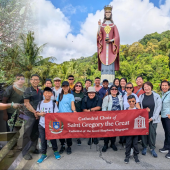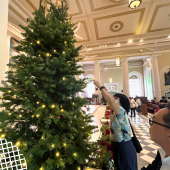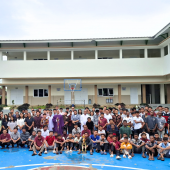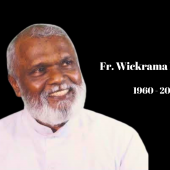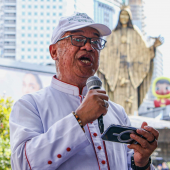Religious Groups in Singapore Urge Respect for All Faiths amid Wave of Anti-Semitic Incidents

The Singapore Catholic Archdiocese and other religious groups have expressed concern over a spate of anti-Semitic incidents in the city-state.
“Any acts intended to deliberately create division and foster ill-will between communities have no place in Singapore,” said a statement issued by the Archbishop’s Communications Office on November 6.
“Our Catholic faith teaches that we are all children of God. This behoves us to love and care for one another, and live together in peace and harmony,” the statement added.
The Singapore Archdiocese was responding to an announcement made by Mr K. Shanmugam, Coordinating Minister for National Security and Minister for Home Affairs, that very day.
Speaking on the sidelines of a closed-door session with members of the Jewish community at the Chesed-El Synagogue, which was celebrating its 120th anniversary that day, Mr Shanmugam said that some toilets in international schools with Jewish students were vandalised with anti-Israel vulgarities in September.
In October, a Jewish man wearing a skullcap and going to another synagogue heard a motorist shout “Free Palestine!” at him. In late October, a Singaporean Chinese man wearing a cap with a patch resembling the Israeli flag was assaulted by a Malay man, Mr Shanmugam told reporters.
A Catholic woman had also reported that a couple had condemned her in the name of God for not doing anything for Palestinians.
Mr Shanmugam also detailed several other anti-Semitic incidents and said that such acts will not be tolerated in Singapore.
“Here in Singapore, our laws and norms reflect a very simple principle: everyone, regardless of race and religion, must be treated fairly,” he said, adding that “all Singaporeans and all communities in Singapore, whatever our feelings towards Palestine or Israel, must feel safe and respected here.”
The Catholic Archdiocese, in its statement, said it is “troubled to learn of recent acts of provocation against our Jewish community in Singapore”.
“In the face of challenges, we urge constructive dialogue, peaceful resolution, and reconciliation, with mutual respect as the foundation of our interactions,” said the Archdiocese.
Singapore’s Inter-religious Organisation (IRO), which represents 10 faiths, said it was disturbed to hear about the incidents. “It serves as a timely reminder for everyone to be steadfast in respecting the religious harmony in Singapore and not tolerate such despicable acts.”
The IRO added that “a slur on any one faith will be seen as a slur on all”.
The Islamic Religious Council of Singapore (MUIS), in its statement, noted that “conflicts and developments elsewhere can create misunderstanding and sow division locally”.
It stressed that “we must not allow the rising wave of Islamophobia and anti-Semitism globally to weaken the bonds of friendship, collective spirit, and unity that we have painstakingly built between our communities in Singapore”.
The Muslim community in Singapore has also been the target of inflammatory acts involving pork sent to mosques.
On September 27, a Singaporean man was charged with deliberately intending to harm the racial feelings of a person. Court documents showed that Bill Tan Keng Hwee had allegedly mailed an envelope addressed to Al-Istiqamah Mosque in the Serangoon North area, which contained a piece of pork and an offensive note.
Tan is also said to be involved in several similar cases at other mosques in Singapore.
Muslims’ religious beliefs forbid them to eat pork.
Radio Veritas Asia (RVA), a media platform of the Catholic Church, aims to share Christ. RVA started in 1969 as a continental Catholic radio station to serve Asian countries in their respective local language, thus earning the tag “the Voice of Asian Christianity.” Responding to the emerging context, RVA embraced media platforms to connect with the global Asian audience via its 21 language websites and various social media platforms.









